This is the guide I wish I had seen on my first visit to the Gap Year Association website when I was fresh out of college with a plate that was full of passion for the field, but empty of professional experience. Experiential education can be a challenging field to break into! However, if you stick with it, you’ll make incredible connections and form enriching relationships while you build experience and land your first jobs. I developed a Career Starters Guide to Gap Year and Experiential Education, which I hope will help you on the beginning of your journey.
My Backstory:
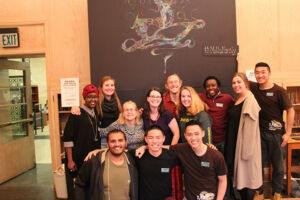 My undergraduate experience gifted me with an abundance of intercultural experiences through cross-cultural communication workshops, cultural events, and language circles at the Mills International Center. I also had several travel opportunities including solo travel to Costa Rica, a study abroad program in France, and an experiential education alternative break program in Guatemala.
My undergraduate experience gifted me with an abundance of intercultural experiences through cross-cultural communication workshops, cultural events, and language circles at the Mills International Center. I also had several travel opportunities including solo travel to Costa Rica, a study abroad program in France, and an experiential education alternative break program in Guatemala.
Of all of my varied travel experiences, the experiential education program enriched and inspired me the most. The leadership and self-transformation curriculum aligned with my life-long commitment to personal growth, and the community-based learning opportunities catalyzed my interest in building more ethics into community engagement and service-learning. Plus, practicing my Spanish daily with community members improved my language skills and inspired me to continue stepping out of my comfort zone. I knew that I wanted to take all of these meaningful experiences and create opportunities for others to have similar experiences.
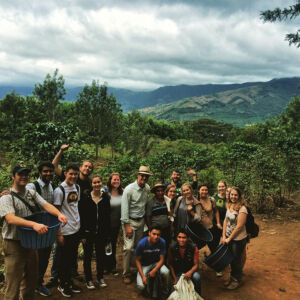 The week after I graduated with a BS in International Studies from the University of Oregon in 2017, I made my way to Johnson Hall for my first informational interview. The bright, sunny June weather in Eugene matched my excitement for my informational interview with the (now former) Experiential Education Director for the Holden Center, a campus organization with which I had traveled to Guatemala. We’ll call him Joe for the sake of this blog. The program I participated in ignited my passions for experiential learning, meaningful travel, and community engagement. I knew I wanted to pursue a career involving those passions. I planned to ask Joe about how to land my dream job as a program director for global experiential education providers directly after undergrad. With my then-limited (read: non-existent) map of the field and lack of industry lingo, I told Joe that I wanted to work with “You know, those organizations that combine experiential education, language learning, intercultural engagement, ethical community-based learning, and deep reflection and transformation. I want to do that.” I had no idea, at that time, in what role I wanted to do that, but I knew I strongly resonated with the missions and work of the global education providers I had learned about thus far.
The week after I graduated with a BS in International Studies from the University of Oregon in 2017, I made my way to Johnson Hall for my first informational interview. The bright, sunny June weather in Eugene matched my excitement for my informational interview with the (now former) Experiential Education Director for the Holden Center, a campus organization with which I had traveled to Guatemala. We’ll call him Joe for the sake of this blog. The program I participated in ignited my passions for experiential learning, meaningful travel, and community engagement. I knew I wanted to pursue a career involving those passions. I planned to ask Joe about how to land my dream job as a program director for global experiential education providers directly after undergrad. With my then-limited (read: non-existent) map of the field and lack of industry lingo, I told Joe that I wanted to work with “You know, those organizations that combine experiential education, language learning, intercultural engagement, ethical community-based learning, and deep reflection and transformation. I want to do that.” I had no idea, at that time, in what role I wanted to do that, but I knew I strongly resonated with the missions and work of the global education providers I had learned about thus far.
“That’s a niche. And your current level of experience would be a very hard sell.” He was right, but I didn’t listen. I had strong passions for intercultural engagement, meaningful and responsible travel, and reciprocal community-based learning and wanted to build a career involving those things. I had my why. What else mattered? It turns out that passion is not the only thing that renders professional success, despite what motivational speakers may emphasize.
Your What Matters as Much as Your Why
Simon Sinek beckoned me to turn the pages of his book Find Your Why (which I do recommend), and examine what brought me to my professional work on a deeper level. Personal transformation seminars encouraged me to look beyond the surface and infuse everything I do with authenticity and intention. I had all of this on my side! During my first professional conference, all I talked about were my reasons for being interested in global experiential education. I asked a colleague about how to land a first job in the field, and they told me that my what matters as much as my why, and that I needed to focus on building some grounded experience.
I graduated college with all the passion in the world for experiential education, language learning, and immersive travel. My why was fostering solidarity between cultures through ethical engagement and activism. And yet I had no experience facilitating that for others. After many informational interviews and conferences for my first year out of undergrad, it was clear to me that I wanted to work in experiential education. I just lacked the experience part.
A year out of undergrad with no luck finding jobs in global education for which I qualified, I started feeling stuck. I learned about Brooke Roberts’ Global Pro Institute (GPI), which was geared toward helping new global education professionals build their careers. Brooke has since updated the GPI program, which is part of her company called Inside Study Abroad with a mission to help every student study abroad smarter while preparing the next generation of global education leaders. When I was her student, Brooke gave me a map of the field, a glossary of terms, and excellent mentorship. During one particular assignment, I printed all of the job descriptions I’d been looking at for Program Director positions, mapped out the overlapping experience required for each, and realized that my dream jobs were 6-8 years ahead of where I was! It was helpful to see this.
I took inventory of the experience that I already had to give myself a confidence boost. Then, I looked at the gaps in my CV, and found a glaring one. While I had traveled short term (oneto six weeks in each location) to fourteen countries: I hadn’t spent extensive time in any one location abroad. This is a key requirement for most global education careers. And it makes sense. The longer one spends in a given place, the more deeply one gets to know the place, language, and culture there. Longevity also helps with cultivating stronger and deeper friendships and professional connections. With Brooke’s help, I came up with a strategy for building extensive experience in Perú, Bolivia, and Ecuador, which would allow me to work with global education providers while serving my own continued commitment to intercultural engagement, global citizenship, and language learning.
I drew on my connections from my undergraduate network, conferences, and my community within the global experiential education world, and I made a plan to intern or volunteer long-term with a few program providers’ NGO partners over the course of two years. I planned a budget to live out of pocket while backpacking in Perú, Ecuador, and Bolivia. I made a game plan for Spanish language learning, including independent study as well as starting a Language Exchange Program for a nonprofit in my hometown to build leadership and coordination experience, foster intercultural engagement as a leader, and practice my Spanish. In order to reach my budgetary goal, I made a monthly savings plan and kept to it for a year!
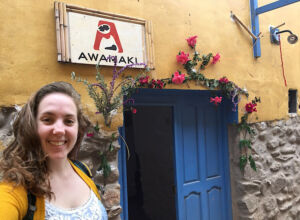
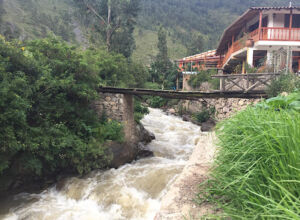 About eight months into 2019, I learned about, applied for, and landed a job as a Service Learning Coordinator with an NGO in Ollantaytambo, Perú. And it was paid! I arrived in Ollanta on February 18, 2020. I began planning participatory discussions for summer groups and the NGO’s partner artisans, started learning Quechua, and loved being immersed in the mountains. I led my first service learning group on March 12, 2020. Yes, March 12th: The day before the World Health Organization declared a global pandemic, which cut my first relevant job to global experiential education short. Needless to say, I repatriated after realizing the pandemic would last longer than a few months. You can read about my repatriation journey here.
About eight months into 2019, I learned about, applied for, and landed a job as a Service Learning Coordinator with an NGO in Ollantaytambo, Perú. And it was paid! I arrived in Ollanta on February 18, 2020. I began planning participatory discussions for summer groups and the NGO’s partner artisans, started learning Quechua, and loved being immersed in the mountains. I led my first service learning group on March 12, 2020. Yes, March 12th: The day before the World Health Organization declared a global pandemic, which cut my first relevant job to global experiential education short. Needless to say, I repatriated after realizing the pandemic would last longer than a few months. You can read about my repatriation journey here.
While taking time to process new changes, I started taking a virtual meditation class, and I re-invigorated my love for ceramics and multi-media art. I made the best of my professional circumstances during the pandemic by dedicating more time to the Gap Year Association (GYA)’s Diversity, Equity, Inclusion, and Access Committee and by attending GYA’s Virtual Professional Member Forums. Ethan Knight, GYA’s Founder and previous Executive Director, introduced me to the Community-Based Global Learning Collarborative’s set of Fair Trade Learning (FTL) principles for improving ethics and equitability in service learning program partnerships. I started assisting with updating GYA’s adaptation to the FTL principles for the GYA Standards of Accreditation in collaboration with the Community-Based Global Learning Collaborative. Seeking ways to provide the GYA community with more FTL resources, I started a new Fair Trade Learning Committee for GYA.
Over time, I took on more responsibilities within GYA and I’m grateful for the opportunity to have served on the GYA team. GYA maintains an incredible community and I’m glad to be a part of it.
My purpose in sharing my story is to highlight that professional development and career building takes as much time as it does intentionality. One thing leads to another when we have the courage to show up with what experience we have, and the commitment to start building a path from there.
Experiential education is a challenging professional field to break into! However, if you stick with it, you’ll make incredible connections and form enriching relationships while building your what around your why! If you’re interested in pursuing work in this field, check out my Career Starter’s Guide to Gap Year and Experiential Education, which I hope will help you on the beginning of your journey. It’s the guide I wish I had at the very beginning of my career. Dream big, take it all step by step, and don’t forget, you can do this!
ABOUT THE AUTHOR
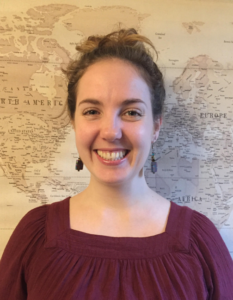 Elizabeth Bezark is a global educator who strongly believes in the power of intercultural engagement to craft deeper levels of understanding and shared humanity in our world. She uses her passions for and expertise in increasing ethics and equitability across global partnerships to significantly advance GYA’s adaption to the Fair Trade Learning standards. She co-designed and now co-chairs the Fair Trade Learning Committee.
Elizabeth Bezark is a global educator who strongly believes in the power of intercultural engagement to craft deeper levels of understanding and shared humanity in our world. She uses her passions for and expertise in increasing ethics and equitability across global partnerships to significantly advance GYA’s adaption to the Fair Trade Learning standards. She co-designed and now co-chairs the Fair Trade Learning Committee.
Elizabeth has also served as a second reviewer of accreditation applications to help organizations improve their practices in alignment with the highest standards in the gap year field, and has developed key systems to streamline GYA’s work such as the Committee Operations Handbook and Editor’s Handbook.
Categories
- Advising (7)
- Alumni (2)
- Career (5)
- College & University (15)
- Communication (17)
- DEIA (4)
- Fair Trade Learning (3)
- Finances (12)
- Gap Year Benefits (69)
- Growth & Development (9)
- Leadership (6)
- Learning & Reflection (56)
- Mental Health (4)
- Planning (61)
- Professional Development (5)
- Research (4)
- Risk Management (3)
- Safety (5)
- Service-Learning (10)
- Standards & Accreditation (1)
- Sustainability (6)
- Voices Project (20)
